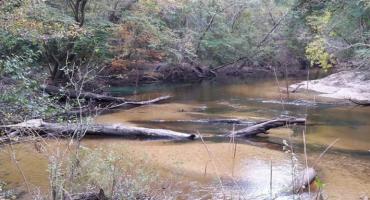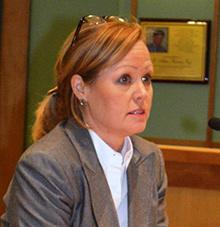
Waste Management is used to getting its own way.
And that's what scares residents of the geologically fragile Panhandle region where the nation's largest garbage handler wants to sink a well nearly a mile into the ground, then inject it with toxic-liquid landfill waste, called leachate.
In fact, it scares no one more than Kelly Layman, who was Gov. Charlie Crist's DEP chief of staff. Layman lives in Walton County now, is knowledgeable about -- and fiercely protective of -- the area's natural resources, its geology and geography.

When Waste Management followed up its application for the well with a public notice that barely was public at all -- after only one person, a reporter, showed for the first meeting because residents hadn't seen the notice, Layman was in.
"I got involved not from an anti-applicant stance, but for me it's a geology and geography appropriateness conversation that has to be had."
Though the well would be located at the Jackson County landfill in Cambellton, Walton is still contiguous geologically. "Everything bad that happens underground to water resources in Jackson threatens Walton, and vice versa," she told me.
"I can't think of a worse place to inject leachate. Walton County has 16 spring-fed coastal dune lakes that don't exist anywhere else in the world. It has three public parks featuring magnitude springs, and there are five state parks within Walton run by DEP with a sixth state park right on the border with Bay County.

"Every water body connected to the Floridan Aquifer is spring fed, and they're all vulnerable to the potential failure of an injection well," she said.
Layman addressed the last Walton County Commission meeting and helped the commission draft a resolution against the well.
Since that early, half-hidden notice in a newspaper classified section, residents have turned out in force to oppose the well. Literally no one I could find anywhere near the Jackson County landfill is in favor of drilling a deep well there.
In fact, the NAACP, Jackson County Commission, the city of Marianna, town of Sneads and Sen. George Gainer, R-Panama City, all are on record as adamantly against it. Walton County is yet to vote on its draft resolution. (See the resolutions in the attachment below.)
"Everybody in Jackson County that wasn't making money off of it was against it," Gainer told the Tampa Bay Times, after a clamorous commission meeting in June.
Leachate, which locals call "garbage juice," is bad stuff. The dark brown liquid contains organic and inorganic chemicals, heavy metals and pathogens; it can pollute the groundwater and therefore represents a significant health risk. Its composition varies a lot, both from time to time and from site to site.
Here's the thing: We're just finding out how bad it can be when we get a deep well wrong.
ProPublica researchers have done a lot of work on this. They say records from disparate corners of the United States show that wells drilled to bury waste deep beneath the ground have repeatedly leaked, sending dangerous chemicals and waste gurgling to the surface or, on occasion, seeping into shallow aquifers that store a significant portion of the nation's drinking water.
The Department of Environmental Protection has issued no permit yet.
Lauren Engel, DEP spokeswoman, said Friday, "To receive an exploratory well permit, the applicant is required to provide comprehensive geologic information. This includes evaluating a one-mile radius around the well location for other wells (both active and abandoned), mines and sinkholes.
 "Applicants must provide information on all identified wells to the Department, including well depth, location and use," she said. "DEP geologists and engineers review this information as part of the permit review process."
"Applicants must provide information on all identified wells to the Department, including well depth, location and use," she said. "DEP geologists and engineers review this information as part of the permit review process."
None of this comforts Kelly Layman, who says, "Look, you can send wastewater down a well. But it won't necessarily stay there. Water is ferocious. It migrates where it wants to go, and it will find its way up.
"What happens when it migrates to abandoned wells and tanks and other easy places to contaminate the drinking water supply? The chilling fact is, there's no way to know until it shows up in your kids' water ..."
It is a little frightening, when you think about it, that we're a state that almost bends over backward to trust deep well injection. We have a history of green-lighting permits for the out-of-sight-out-of-mind treatment of all kinds of evils. We have 262 injection wells now -- way more than any other state but California, and four permitted for leachate.
Said Engel, "All four leachate wells are working as permitted."
Well, no disrespect intended, but the moment Engel assured me of the "success" of previous leachate wells was the very moment I figured this exploratory well permit, as proposed by big-business Waste Management, is a slam dunk.
In the first place, the big waste company and DEP are no strangers. The state knows, I'm sure, that the $32.2 billion provider of waste management environmental services stands at No. 481 on Forbes Magazine's Global 2000 list of the world's largest public companies.
Its legal department alone eclipses most Florida businesses.
In the second place, I can't imagine DEP permitting an exploratory well which would cost $5 million to build, then denying Waste Management the final permit to use it. Can you? Remind me to ask Lauren Engel next time if DEP has ever done that.
Jackson County Administrator Ernie Padgett, like his county commission, opposed an injection well from the start. "You have to drill through three aquifers. The risk is too great," he said.
"For Waste Management, it's a business decision," he said. "They told us they had to have the well because other sites couldn't take anymore leachate. Come to find out, treatment facilities in places like Sneads had plenty of room for it. They want to inject Jackson's waste and probably anybody else's who can pay."
He said he asked the waste hauler for a list of all out-of-county garbage waste coming to Jackson County. "They refused to give it to me. They told me it was proprietary information," he said.
Padgett, who has been an administrator in four counties during his 30-year career, said, "If I had my way, I'd like to see Waste Management team up with municipalities to put in a state-of-the-art water treatment plant."
"They're big and rich and we're poor and small," Jackson County resident Myra Johnson told Sunshine State News on Friday. "Waste Management is just going to push this through no matter what we want.
"I feel like, if they go through with this, we could become another Flint (Michigan)," she said.
The trouble is, injection wells in the Sunshine State have experienced spectacular failures. ProPublica points out, in South Florida, 20 of the nation's most stringently regulated disposal wells failed in the early 1990s, releasing partly treated sewage into aquifers that may one day be needed to supply Miami's drinking water. And according to the Tampa Bay Times, some of the 20 million gallons of wastewater Pinellas County had been injecting into a deep well every day during a seven-year period in the 1990s had been leaking back to the surface and spread more than a mile from the well.
I'll leave you with this: There are more than 680,000 underground waste and injection wells nationwide, more than 150,000 of which shoot industrial fluids and poisonous waste thousands of feet below the surface. ProPublica tells us, "Scientists and federal regulators acknowledge they do not know how many of the sites are leaking."
Feels to me as if the residents who stand in opposition to the well are walking the high ground (no pun intended).
Reach Nancy Smith at nsmith@sunshinestatenews.com or at 228-282-2423. Twitter: @NancyLBSmith
READ MORE FROM SUNSHINE STATE NEWS
Marco Rubio Leads the Charge on Capitol Hill for More Sanctions on Hezbollah



Comments
NOTE TO TODD: Sunshine State
Lee, please email me at my